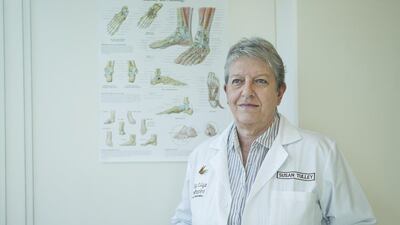ABU DHABI // There is a desperate lack of podiatrists for patients with diabetic foot – one of the biggest complications associated with diabetes – which can lead to amputation if not treated.
Susan Tulley, head of podiatry services at Abu Dhabi’s Healthpoint, said there were only eight full-time and two part-time foot doctors in the emirate.
“The World Health Organisation recommends that for this area and for the problem we need at least 200 specialists, and that is for diabetics,” Ms Tulley said. “You can see the problem. There are not enough of us.”
Diabetic foot is often overlooked as a complication of the disease, and there is fear of amputation in having it seen to, she said. “The three main microvascular complications of diabetes are eyes, feet and kidneys, in that order,” said the British expatriate, who has more than 20 years experience in the Middle East.
“In this part of the world eyes and kidneys tend to be well covered and feet have been neglected. People are always frightened of going to hospital with a foot problem because they are scared of amputation. They believe one thing will lead to another.
“It is not inevitable. But if you have not got any prevention in place it will become inevitable.”
Every 20 seconds, somewhere in the world a limb is lost as a consequence of diabetes, said Ms Tulley.
The first sign of diabetic foot is usually a wound or lesion on the foot that does not heal.
“It is likely that [the victim] will get a lesion of the foot, because of a shoe or a sandal, from walking around, that you and I would notice but they don’t.
“They cannot see it because the eyes have gone and they cannot feel it because of neuropathy [nerve damage] in the feet.
“Sometimes it is when they notice the smell of something or the trail of blood that they realise that there is something wrong.”
More than half of all foot ulcers in the world will become infected, with a fifth of them resulting in amputation. This can range from a toe to a below-the-knee amputation.
Ms Tulley said early detection was vital. Screening programmes for diabetics should include an annual foot check-up, she said.
jbell@thenational.ae

